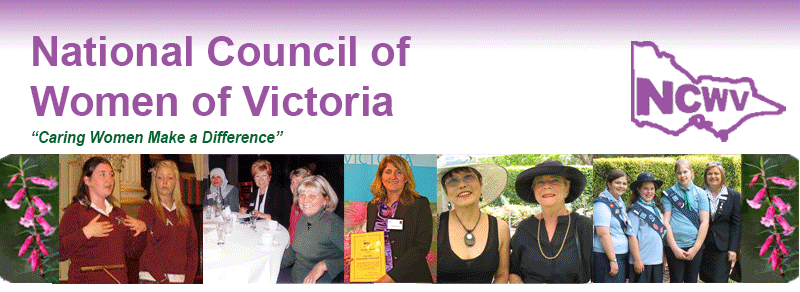Speakers were Dr Deborah Towns OAM and Pam Hammond MEd (Maths Education)
This was a follow-up to two previous presentations to NCWV: one by Inbal Steinberg who analysed a reading program being used at her sons’ school, finding many stereotypes in these books.
The other, NCWV member Adrienne Fleming, an aviator who interviewed students about their wish to be a pilot. She found in Preps, Year 1 and 2 girls put their hands up as much as boys, but this diminished somewhat in Year 3, and dramatically in Year 4. Deborah and Pam went on to say that there can be many reasons for this:
‘Without modification to the attitudes and values of the wider community and the media, girls will continue to be educationally, socially and economically disadvantaged.’ National Action Plan for the Education of Girls 1993-97. Deb and Pam focussed on the stereotypes in picture story books, as the first 7 years of a child’s life is when they are open to being influenced, positively or negatively. They are developing understandings about gender, themselves and expectations of their roles in the family, with peers and in the world around them and can impact on aspirations. Books also provide models of male and female behaviours and help children explore social issues and relationships.
Why don’t we have more female scientists? Why are so few men nurses? The root of most gender imbalances starts early. By recognising/challenging these stereotypes we can lift the limits they place on children’s aspirations, choices and outcomes. Limit lifting Program UK
Deb and Pam quoted from research, one by a Phd student Sarah Mokrzycki at Victoria University, who analysed 100 best-selling picture books, identified by Dymocks in 2019. Female protagonists were seen in only 17% of the books, while 46% had male protagonists. Only seven books were female led in the top 50, compared to 26 male led books. Sarah found that the roles taken by the male characters ranged from farmers, chefs, scientists, builders to knights and more, whereas female characters were princesses, ballerinas, mothers, shop assistants, other stereotypical roles. These statistics were found in analysis of 100 best selling children’s books, 2018 in the UK: Male villains were 7 times more likely than female villains, female characters were less likely to speak, 59% of characters were male, with only two books having a main character who was also from an ethnic or black group.
An Edith Cowan University study, lead author Dr Helen Adam, criticised popular books: Harry the Dirty Dog which portrays 24 males in stereotypical roles, the dog is ‘he’ and there are only seven females, mostly passive; also the Disney Princess Series where girls are saved by males. Dr Adam adds “The male is strong and he knows best … it’s how we end up with some of the problems in society, there are messages of patriarchy everywhere.” The study in eight early learning centres in Australia and the United States into gender representation analysed books using Harper’s Framework of Gender Stereotypes in Children’s Literature. These include language, roles, relationships, emotions, attitudes, activities, achievements, values, needs and experiences. Some showed disruption of previous representations of masculinity and femininity.
Deb and Pam showed books which included stereotypical roles, as well as those which were more sensitive to this. With a table of Harper’s categories, participants analysed picture story books, commenting on what they found. One notable example, The Gruffalo, an extremely popular book of the early 2000s has all fictional and animal characters being male and aggressive. The author, Julia Donaldson, wrote a sequel, Gruffalo’s Child in which the child is female and the Gruffalo is a doting and caring Father! How good is that!!
They also showed books that help children to understand who they are and who they can be, explore social issues and relationships and talk about their feelings. Stereotypes are outside the classroom. Toys and games are marketed as being ‘for’ one gender or the other, ‘girl’ and ‘boy’ colours, LEGO has succumbed! Even things as apparently innocuous as colouring books are promoted as being for one gender or the other. Research has demonstrated how discussions and using literature for addressing stereotypes can have a significant impact on engagement and learning. In concluding Deb and Pam said, “We don’t want to exclude all books that are not gender neutral, we need fairies and goblins, imagination is important. Many are high-quality literature with good use of language and positive messages, but educators need to be aware and ask appropriate questions for children to reflect on the roles represented. Schools, early educators, parents, librarians, publishers, authors need to identify unintended messages books carry if they portray stereotypical roles and behaviours in the books they select/write.”











